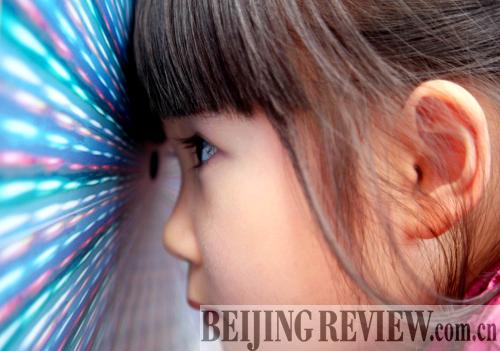|
 |
|
ENTERTAINING TECHNOLOGY: A little girl stares at the pictures in a "peep box" with breathless interest on September 19, a local science popularization day, in Nanjing, Jiasngsu Province (WANG XIN) |
Shanghai Ocean University students who run their own shops are trying to introduce artificial floating island technology in household aquariums for those residents who like raising fish. Such islands can help save electricity and allow residents to change water less often. They also do not have to worry about oxygen content in the water because cultivated plants on the island can absorb carbon dioxide in the water and air and provide oxygen to the fish.
Platform of practice
"The science shop delivers scientific achievements to the society, while practicing on communication of science helps university students," said Pan Yingjie, President of Shanghai Ocean University.
He said the science shop is a bridge linking the cultivation of personnel, scientific research and social services provided by universities.
"Students understand professional knowledge much more deeply by using what they learn in the classroom in practice," said Cui Ying, an instructor with Shanghai Tongji University's science shop.
Student volunteers working at the science shops agreed.
"Operating the science shop is a great experience for us to gain more social knowledge," said Cen Guanding, an ECNU Information College student.
Wang Yonglin, a student from ECNU's Department of Electronics, said the shop helps him realize his dream of using his inventions to improve society.
"I often bring my small inventions to the shop. I am glad that many people like them," he said.
Gao Xiangdong, a professor from the Demography Department of ECNU, said the shops set up a new platform for science to serve society. They can integrate different resources in a better way and help build a science team consisting mainly of university students, he said.
Science popularization
"From blackboard newspaper to science popularization lectures and then to today's science shop, the community science popularization movement is making changes and trying to break through the single style of a one-way transfusion of knowledge," said Li Junxiu, Vice Director of the Shanghai Municipal Education Commission.
The shops can help bring science into people's lives and also provide a platform for university students to step off campus and participate in social activities. The science shops have successfully combined social requirements and the education system.
The diffusion of academic knowledge is normally done through researchers communicating to society, but there is a growing demand for communication to go from the society to researchers. This reversed trend is an indication of the public need for understandable science, which requires researchers to interact and understand the needs of the public.
Early in 2002, China established the Science and Technology Popularization Law, which was the first law in the world designed to popularize science. In 2006, China published the Outline of the Action Plan for the Nation's Science Literacy (2006-10-20), putting science popularization into the spotlight of the national development strategy for science and technology for the next 15 years.
Li Jianmin, Director of the Shanghai Promotion Center for Science and Technology Popularization, said the science shops have been active in putting systems and models in place to accomplish the goal.
"The development of the science shops still needs multi-party support," said Chen Lingxi, a teacher from ECNU. He said governments should provide institutional support and universities should give financial support to the shops.
"Passion from the universities and communities is the motivational power that will sustain the development of science shops," he said.
About Science Shops
The science shop idea started in the Netherlands as part of a University of Utrecht and University of Amsterdam students' project in the 1970s. The Dutch students, with support from their universities, helped local non-profit organizations (NPOs) solve scientific problems. The students gradually set up community organizations to accomplish their mission. There are now more than 30 science shops scattered by the universities throughout the Netherlands. They provide assistance dealing with practical scientific problems, such as sorting garbage, and offer free or low-priced services to individuals, groups, NPOs and small businesses that cannot afford to do research on their own.
Their services and research are community-based and range from the natural sciences and the social sciences, such as sociology, psychology, health care, legal analysis, environmental awareness, information technology, arts and business, to research on local history. Their services are intended to help create a society oriented toward science that is focused on the betterment of society.
The shops for the most part belong to universities, though some are organized as separate NPOs. They combine research and teaching with service to society. Civil society organizations can contact one of the shops with a problem in which research would help find a possible solution. Science shop workers then turn the requests into research projects and find students or staff to work on them, maintaining close contact with the client. The results are handed over to the client and the shop's staff support putting the results into practice. They also help to formulate follow-up proposals, including those relevant to the client and those calling for further research. The process generates new knowledge while adapting existing knowledge for practical use.
| 